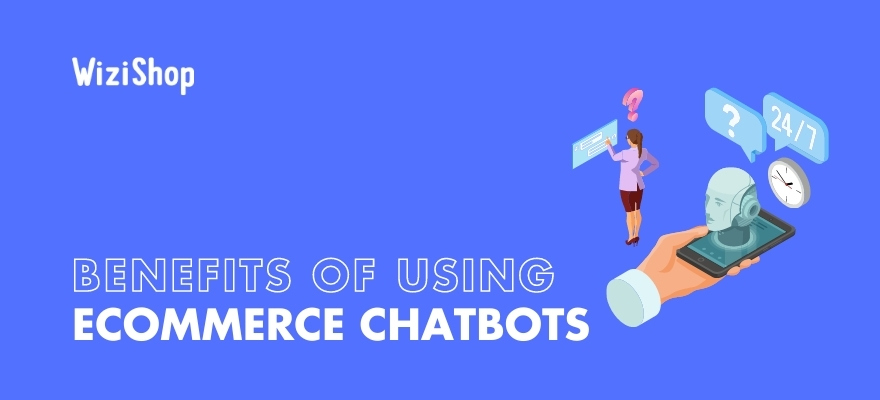Key points in this article:
- A chatbot is a computer program designed to simulate human-like conversation online by interpreting user inputs (via keywords or phrases) and responding with relevant solutions.
- With the constant evolution of technology and high expectations for customer experience, ecommerce chatbots are increasingly important tools for retail platforms.
- Chatbots offer efficient, automated interactions that help retailers scale their businesses while serving shoppers in a personalized and timely manner.
- Chatbots are among the most widely adopted forms of artificial intelligence in e-retail, demonstrating their versatility across various online contexts such as support, recommendations, and engagement.
- By handling routine queries and providing swift responses, chatbots can significantly lower support staff workload and related expenses.
If there’s one thing that’s constant about ecommerce is that it’s always changing. Owners of online stores must constantly be on the lookout for new ways to serve their customers and improve the shopping experience.
Ever-evolving technology has led to quite a few ecommerce innovations to help support businesses involved in online sales in recent years, notably the increased presence of chatbots—one of the most popular examples of artificial intelligence found on e-retail platforms today.
If your site isn’t already using chatbots, keep reading to learn why you may want to plan to start implementing a bot to chat with shoppers, especially if you’re looking to scale your ecommerce business!
What is a chatbot?
A chatbot is basically a computer program that’s created to talk with users on the internet in a way that simulates human conversation.
This type of conversational bot works by using an algorithm to determine what the user needs and then responding with an applicable solution based on the keywords it finds in the user’s text.
Today, you’ll often see brands using bots in social media and ecommerce, as they can be adapted to nearly any situation and online store.
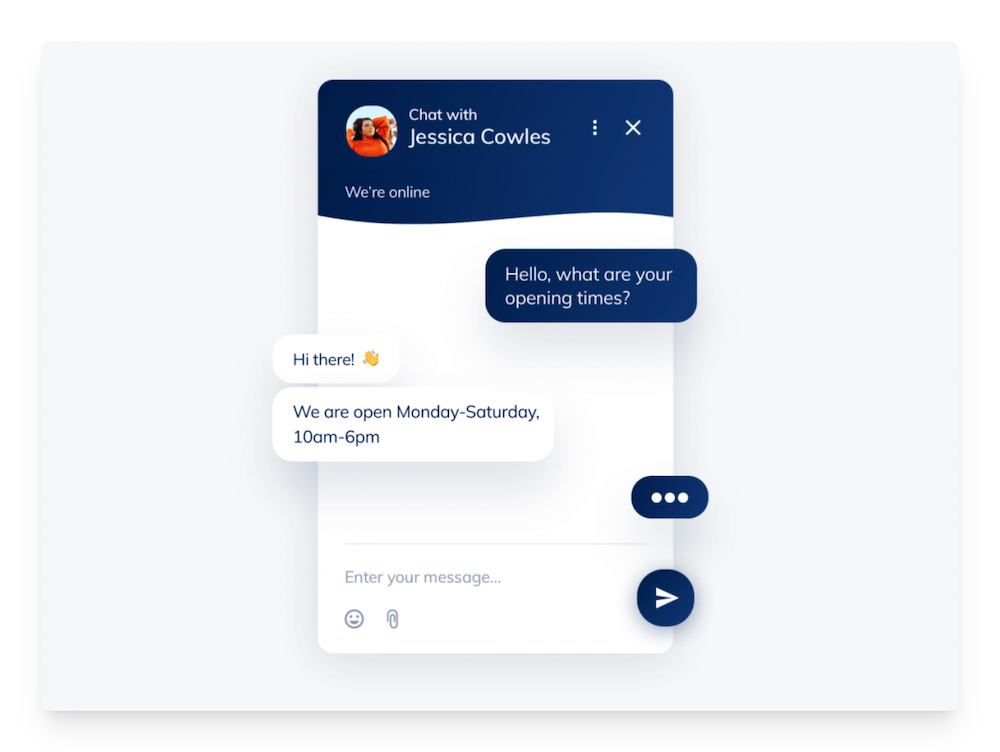
Example of an ecommerce chatbot by Tidio
Whether you’re purchasing clothing, reserving theater tickets, or ordering a delicious take-out meal, it wouldn’t be uncommon for you to come across a chatbot at some point during the process.
Most ecommerce businesses today use chatbots to assist customers with finalizing an order, suggest products to visitors, or administer customer service.
Benefits of chatbots
The reason why AI chatbots are so widely used in ecommerce is because professionals see them as a way to connect naturally with increasingly demanding customers. And in my experience in ecommerce, I have seen all the advantages of this support, which is almost indispensable in online sales today.
Support for your customers
In a store, when a customer has a question or expresses doubts about the brands they encounter or the types of products offered by the company, the presence of a human being can reassure them in their purchasing decision.
On the internet, however, there are no salespeople present. This is a real disadvantage for users and can become a barrier to purchasing online.
To counter this problem, there is a smart and innovative technology that has a secure place in the future of ecommerce: the ecommerce chatbot.
According to a report by Grand View Research, the global chatbot market amounted to $7.76 billion in 2024 and is predicted to reach $27.29 billion by 2030.
Integration into your ecommerce solution
On this platform, which is integrated into website pages, ecommerce sites, and blogs, users are invited to engage in dialogue. They can ask questions as they would to a human advisor.
The only difference is that this time, they’re talking to a robot, a bot, a type of artificial intelligence designed to provide answers in an automated way.
Support for customer service
Chatbots are the first line of defense for customer service, filtering out many questions and answering them efficiently in complete conversations.
It can perform several functions, including the following:
- directing the buyer to a specific page;
- answering general questions or questions about a specific product;
- making product recommendations;
- guiding the user through the purchasing process for a better user experience;
- informing the customer that an item is out of stock, possibly also telling them when it will be restocked;
- providing certain support functions;
- asking the customer about their satisfaction; and
- displaying specific and/or promotional offers.
Using bots to chat with shoppers is a great way to boost your sales naturally and non-invasively, as well as improve customer relations effortlessly!
What are a chatbot’s tasks in ecommerce?
Are you looking for an effective solution for marketing your ecommerce business that integrates naturally into your visitors' browsing experience? A chatbot will be your best ally: here are its main tasks.
Assist each customer service agent in processing requests
Customers shop at all hours of the day. A chatbot is always there. It responds immediately and prevents prospects from leaving.
A 2023 study by Dydu determined that 29% of consumers want help 24/7. The study also shows that 60% find talking to a human advisor stressful.
This is where a chatbot makes all the difference. It’s always there, ready to respond, reassure, and guide.
Example: A customer is hesitating to order an item because they have a question about delivery. It’s 11 p.m., and no human customer service representative is available.
The chatbot responds immediately: “Standard delivery will take 7 business days, but if you order within the next hour, you can take advantage of the express option at a reduced rate!”
The result? The customer doesn’t wait until the next day to look for the information, they get their answer in seconds... and confirm their purchase right away. Without this instant assistance, they might have put off their decision until the next day... and who knows? The risk is that they might forget about it completely or find another, more responsive site in the meantime.
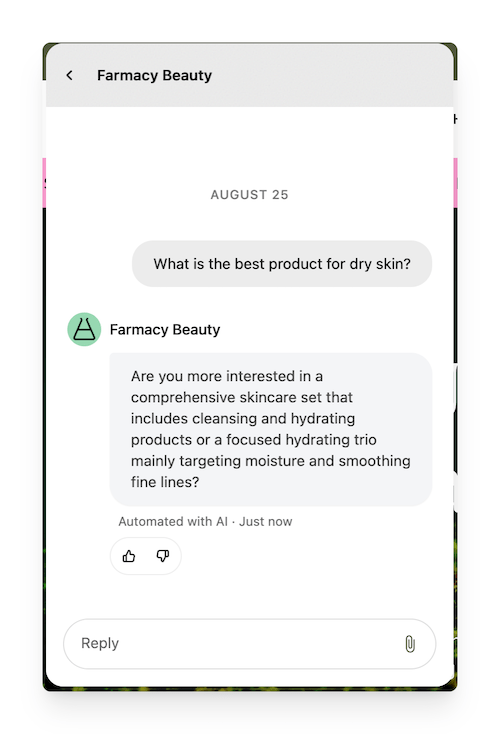
Chatbot on the Farmacy Beauty site
Play on the sense of urgency
There are times when a customer is on the verge of confirming their shopping cart... but they are still hesitating.
They think about it, telling themselves they could wait a little longer, compare elsewhere, put it off until later.
And this is precisely where the chatbot can play a decisive role: by injecting just the right amount of urgency and scarcity to turn that hesitation into an immediate purchase.
We’re all susceptible to the fear of missing out on a good deal. When a product we covet becomes scarce, it suddenly takes on more value in our eyes.
And chatbots know exactly how to use this psychological effect to speed up the purchasing decision.
Example: A customer is looking at a pair of limited edition sneakers but is hesitating to finalize their purchase.
Message: “Warning: There are only 2 left in stock! And last time, this model sold out in a few hours.”
The result? The fear of missing out prompts immediate purchase.
Another highly effective urgency lever is time pressure. When a customer knows that an offer won’t last forever, they’re much more inclined to make a purchase on the spot.
Example: A user adds a shirt to their cart but doesn’t check out right away.
Message: “Good news! You’ve unlocked an exclusive 15% discount, but it expires in 10 minutes!”
The result? The customer doesn't want to miss out on this discount and completes their purchase immediately.
Beyond simply encouraging the purchase, the chatbot can also motivate the customer to add even more products to their cart by playing on the immediate reward effect.
Example: A user views a perfume, hesitates, then finally adds the bottle to their cart. The chatbot intervenes at the right moment:
Message: “Well done, you’re only $10 away from free shipping! Why not add this matching shower gel?”
The result? Rather than “losing” free shipping, the customer adds an extra product... and everyone wins.
Reduce cart abandonment rates
This is an excellent way to avoid losing customers during the purchasing process and, ultimately, to increase your sales.
To better understand, imagine, for example, that a user visits your ecommerce site and views the page for one of your items.
At that moment, even though they like the item, they have doubts...
It’s an item that they’ll need in 7 days. They add your item to their cart anyway.
The product fully meets their expectations, but they wonder if it will be delivered on time after purchasing it online.
In this case, there’s no need to contact customer service: the chatbot is fully capable of responding to this type of user request.
Since the customer receives a response within seconds, any doubts are dispelled, preventing them from abandoning their shopping cart and going to a competitor’s site or directly to a store to try and buy the product.
Customer relations are optimized and your conversion rate is looking good thanks to conversational commerce!
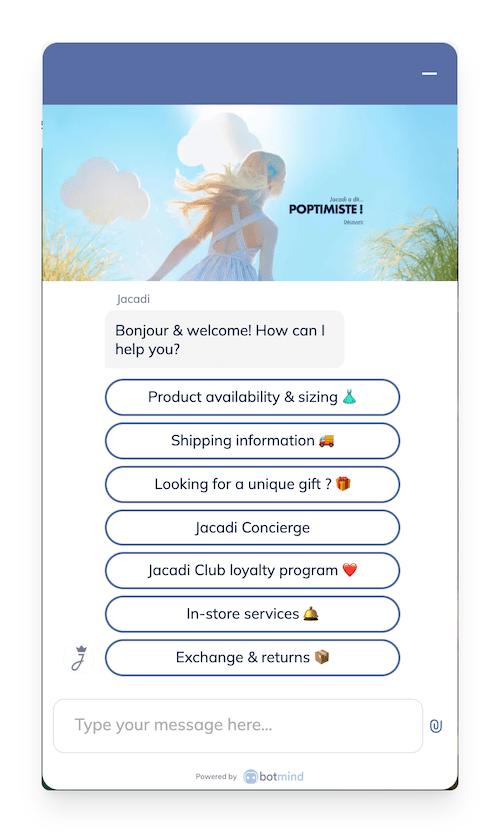
Chatbot on the Jacadi site
Increase average cart value
A good salesperson in a store never lets you leave with just one item.
They guide you, introduce you to other products that could perfectly complement your purchase, and make you realize that, ultimately, you also needed that little extra something.
The chatbot plays exactly this role, but in a digital version.
This isn’t hard selling—far from it.
It’s optimized customer service that anticipates needs and offers solutions before the user even realizes they need them.
And that’s exactly what boosts the average order value.
A well-designed chatbot knows how to leverage two highly effective psychological levers to increase the average cart value:
- Cross-selling: The art of offering complementary products.
- Upselling: Suggesting a superior or more complete version of the product the customer already wants.
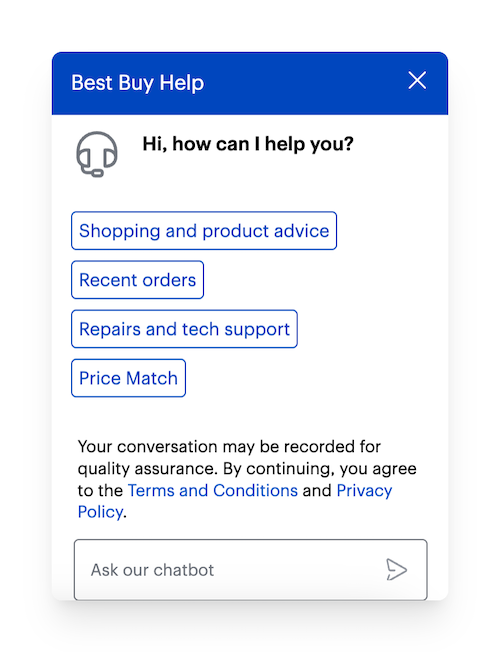
Chatbot on the Best Buy site
Collect certain types of data about visitors and consumers
Today, we’re bombarded with impersonal offers and suggestions.
What your customers want is not a standardized list of products “that everyone buys,” but personalized recommendations that speak to them, that seem designed especially for them.
And that’s exactly where an AI-powered chatbot makes a difference.
It analyzes browsing behavior, purchase history, and can even ask questions to refine its suggestions.
💬 “Are you more of a tea or coffee person?”
💬 “Do you travel often?”
💬 “Are you looking for a product for yourself or as a gift?”
These exchanges make the ecommerce customer experience more human, more engaging, and above all... more effective.
Because a customer who feels understood and supported is much more likely to trust recommendations and add one or two more items to their cart.
Reduce staff costs
Chatbots don’t replace humans, of course, but they can clearly help internet users to easily resolve issues without the need for customized follow-up for each request.
You can program them to provide answers already included in your FAQs or opt for answers powered by artificial intelligence.
You can also offer scenarios to guide users through their questions and provide them with the appropriate answers.
For example, you can offer a choice of topics in the instant messaging pop-up, such as “delivery,” “product information,” “make an appointment,” or any other topic related to your business.
Then, using multiple choices based on the visitor’s navigation, the user selects their request. And so on until the problem is resolved on your online store.
If the question isn’t resolved, then you give the user an easy way to contact a human from your support team by the means of their choice (online interactions, by phone, etc.).

Assistance available via various methods on the Amtrak site
Here are some ideas for questions your chatbot could handle:
🛍️ Product questions
- “Is this product available in size M?”
- “What fabrics are used in this dress?”
- “Is this phone compatible with 5G?”
- “Do you have black leather shoes for men?”
- “What is the storage capacity of this travel bag?”
🚚 Shipping and delivery questions
- “What are the delivery times?”
- “Do you ship internationally?”
- “Is delivery free?”
- “Where is my order?”
💸 Questions about payments and promotions
- “What payment methods do you accept?”
- “Can I pay in installments?”
- “My promo code isn’t working. What should I do?”
- “Do you have any discounts available right now?”
🔁 Questions about returns and refunds
- “How do I return an item?”
- “How many days do I have to return an item?”
- “When will I receive my refund?”
- “Are returns free?”
👤 Questions about customer accounts
- “I forgot my password. What should I do?”
- “How do I change my delivery address?”
- “Can I view my order history?”
📦 Order tracking
- “Has my order been shipped?”
- “My package is marked as delivered, but I haven’t received it.”
- “Can I change my order after it has been confirmed?”
📞 General assistance / after-sales service
- “How can I contact customer service?”
- “What are your opening hours?”
- “I received a damaged item. What should I do?”
🤖 Personalized suggestions
- “What do you recommend for a birthday gift?”
- “I like this style. Do you have any similar items?”
- “How satisfied are you with your browsing experience?”
Provide reassurance and handle objections
Chatbots offer numerous advantages in reassuring customers online, as they can respond to their concerns more quickly than humans, who may be less responsive.
And as you can imagine, time can be crucial when it comes to closing a sale!
For example, a consumer may want to make sure that a product does not contain eggs for her child, who is allergic to them.
She will likely ask a food brand’s chatbot about the product’s ingredients.
The chatbot, powered by generative AI, provides detailed and accurate information about the product’s composition and potential traces, reassuring the customer and encouraging her to complete her purchase.
Optimize your messages and communications with customers
For a chatbot to be effective and appreciated by customers, certain rules must be followed to avoid giving the impression that everything is controlled by soulless generative artificial intelligence:
- Humanize your chatbot as much as possible, without making your customer think they are talking to a human. Why not give your little robot a name and/or add a photo?
- Adapt your chatbot's language so that it fits perfectly into your online brand universe (it can be serious or more humorous, use informal or formal language with users).
- Send a welcome message to encourage customers to start a conversation.
- Vary the response formats to add rhythm to conversations.
- Set up interactions that seem natural and personalized.
- Provide feedback to ensure that the chatbot has responded correctly to your customer’s request: this is also an excellent way to improve your service.
- Don’t use overly technical vocabulary.

Chatbot on the David’s Bridal site
Types of ecommerce chatbots
If you’re hoping to begin using ecommerce chatbots, it’s good to understand the different kinds available to you. They vary in levels of intelligence, so which type(s) you decide to use will depend on the specific needs of your business and your customers.
Rule-based chatbots
Best used for answering simple questions, rule-based chatbots, also known as “scripted chatbots,” follow a set path. There are limitations with this type of bot, as it can generally only respond with specific answers to questions that have already been determined.
Customers are often offered a range of predefined choices, which are used to lead them to the answers they seek. These chatbots can assist with sales leads, perhaps by organizing a call, and customer support, by providing a helpful website link or generic responses.
Many brands with a Facebook business account use this type of chatbot via Facebook Messenger to offer users automated customer service.
Although these chatbots can certainly assist with improving the ecommerce customer experience, they’re usually quite dependent on keyword usage. If the chatbot is confronted with a typo, it may not be able to offer the correct solution, causing increased frustration for the user and potential missed sales.
Artificial intelligence (AI) chatbots
For more complicated matters that can occur, AI chatbots, otherwise referred to as “smart chatbots,” may be a better option. This type allows users to type or even speak into a chat box.
The chatbot should have a reasonably good understanding of various questions and commands that it might encounter, allowing the bot to respond to the user’s request appropriately and in a short amount of time.
Employing natural language processing (NLP) technology, AI chatbots are able to comprehend the intent behind the user’s query. Because of this, no actual human interaction is required to provide a solution to the user’s issue.
What’s also interesting about these bots is that over time, their functionality actually improves as they face different questions from customers. This increase in intelligence helps them to better serve users and offer businesses even greater efficiency.
Note that AI chatbots usually have limited knowledge, though, and can’t respond to queries that extend beyond the topic for which they’re created.
Despite the greater intelligence that conversational bots with NLP technology possess, your online store might find that they’re an unnecessary expense. Rule-based chatbots may be enough to support your site, and they generally tend to be easier to create and use and less expensive.
What are the different types of interactions with a chatbot on an online sales site?
Chatbots can be used at several points in the purchasing process.
Upon arrival on the site by the visitor
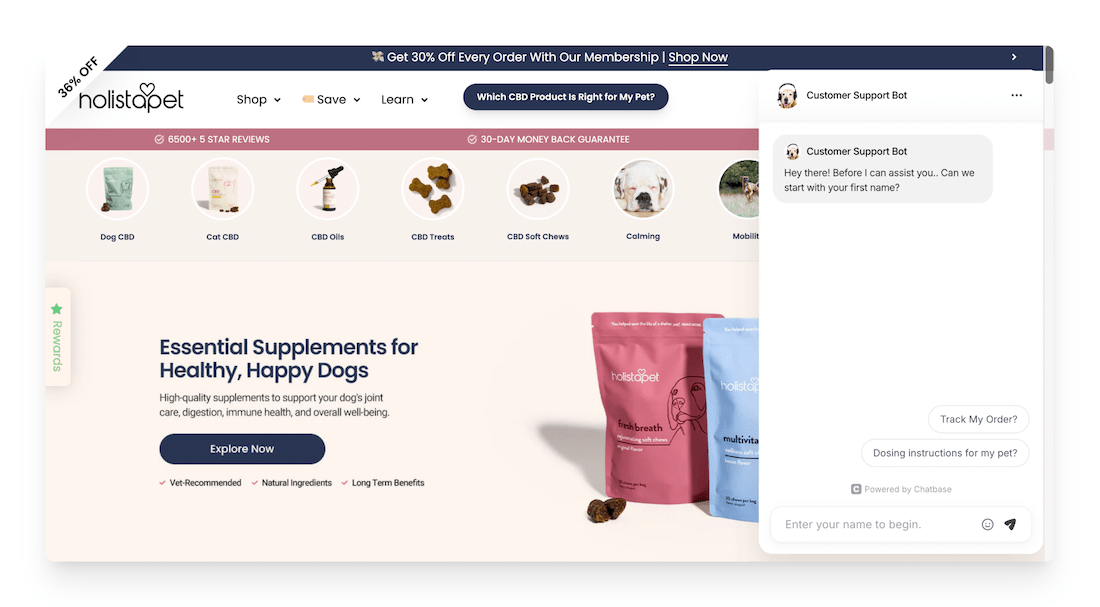
Holistapet chatbot
The chatbot can be proactive and interact with your customers as soon as they arrive on your ecommerce site.
For example, it can send them a welcome message to start the conversation or immediately direct them to a specific page related to your new products.
The goal? To welcome visitors to your page in the same way a salesperson would in a store and to prevent them from feeling lost by building a relationship of trust.
To keep your visitors from leaving, guide them!
When visitors search for products
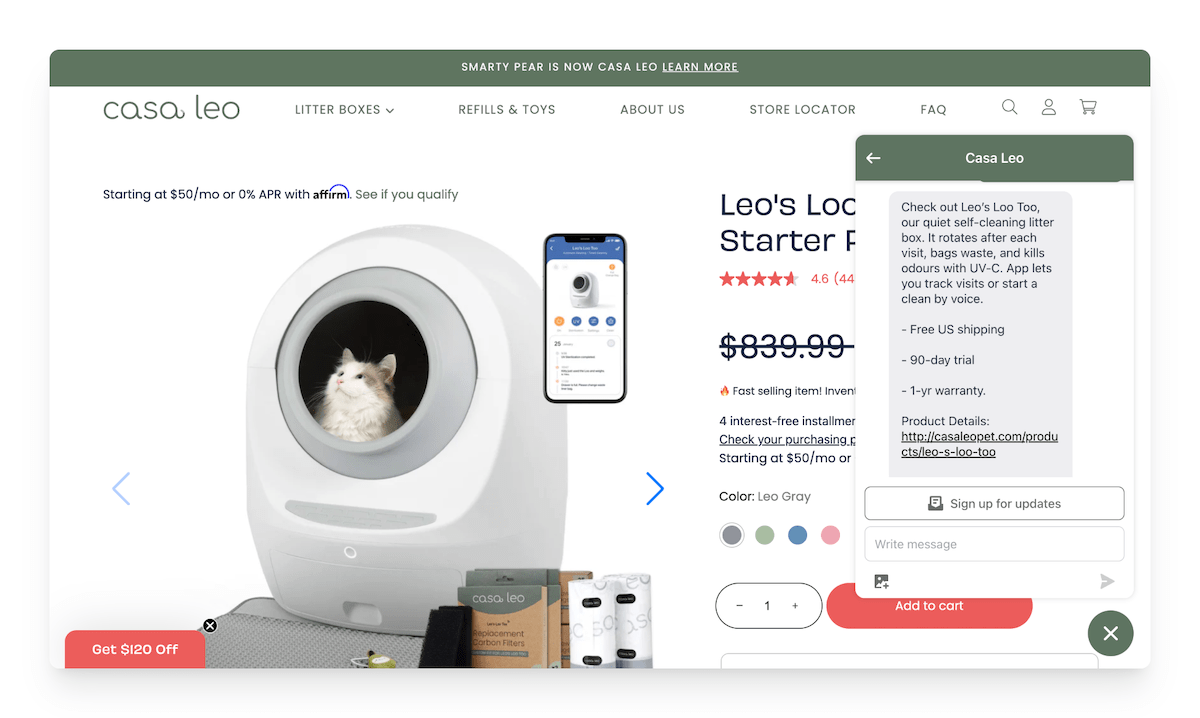
Casa Leo chatbot
Chatbots can boost the customer journey to prevent shopping cart abandonment.
In this case, they can, for example, re-engage the consumer before they finally leave your site without paying and finalizing their order.
They can also make product suggestions based on an analysis of customer queries or recent sales and top-selling products.
Another possible technique is to offer a promo code or an unmissable deal to users who are about to leave. Of course, this should only be done if your cash flow allows it!
To give advice on your products
The chatbot is a valuable aid in convincing consumers to finalize their purchase. When users like an item, they often seek additional and more detailed information about it.
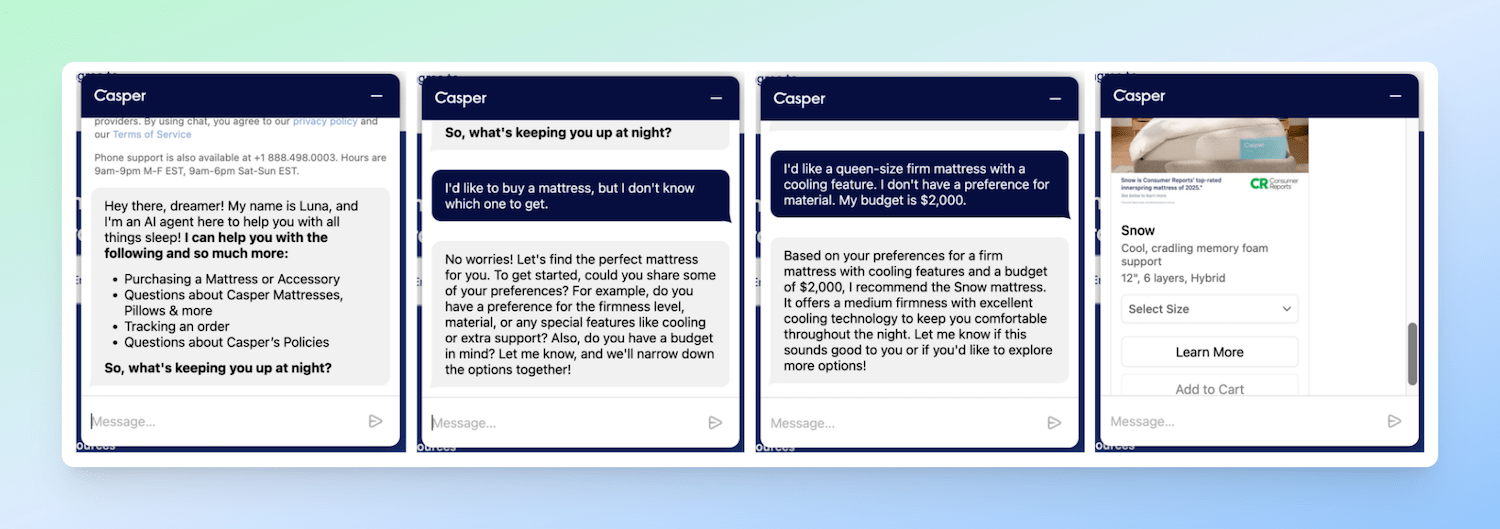
Luna, the chatbot on the Casper website
Here, Casper’s Luna chatbot helps the visitor in finding the best product to suit their needs. The chatbot is there to assist!
It can be present while the user is browsing the product pages. In any case, it needs to be a point of reference, to avoid as much as possible the customer feeling alone with their unanswered questions.
After the purchase, for customer service and loyalty
The role of chatbots doesn’t end once the transaction is complete. They can also be used to obtain customer feedback on their order.
In fact, all opinions are useful, even the most negative ones, in order to improve.
With the help of your chatbot, don’t hesitate to encourage your buyers to make suggestions or comments, leave a rating, or fill out a review on Google, for example.
On social media
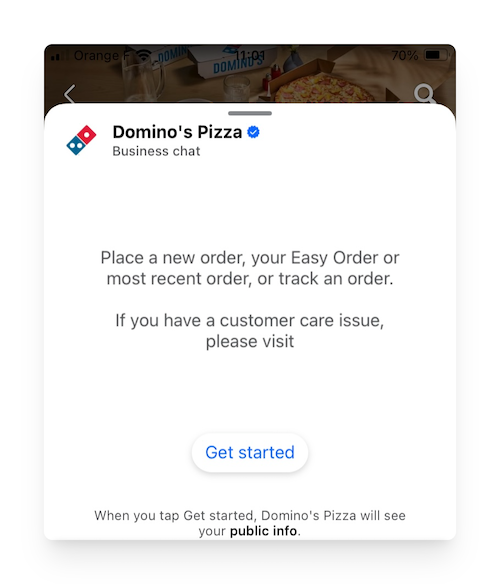
Ability to order via Messenger with Domino’s Pizza
Many e-merchants have understood this and have focused on ongoing communication about their brand, products, or services.
And where are potential customers? On social media.
Your chatbot can even be extended to your social media accounts.
When a new subscriber joins, why not send them a promo code directly via direct message?
If your subscriber comments on your post with a specific word, you could automatically send them a promo code, document, or other content.
Some retailers also appreciate the help of WhatsApp in their customer journey with targeted automations.
What’s more, the WhatsApp button can be added directly to your Google Business listing, allowing you to create a scenario with a chatbot to begin conversations from Google.
Examples of successful ecommerce chatbots
When you incorporate well-designed chatbots into your online store, the advantages for you and your customers can be plentiful. To help inspire you, here are a few examples of ecommerce chatbots that have proved particularly successful for the companies that use them.
Sephora
Sephora is known for its extensive selection of makeup and beauty products that it features, both in physical stores and on its online platform. Shoppers walking into one of the company’s physical stores or checking out the website could easily get overwhelmed by the vast variety of products available.
To better assist customers in deciding what products are best suited for their needs, Sephora created an advisor chatbot, which operates on the Kik app. The bot targets members of Gen Z, who tend to prefer communicating via messaging apps rather than email.
To start, the chatbot provides people with a quiz to obtain relevant data, such as makeup brand preferences, the user’s age, and more. Based on this data, the chatbot is then able to make personalized recommendations and offer makeup tips.
It can also lead users to other Sephora content that may be applicable to them, such as product reviews and how-to videos, boosting the company’s content marketing efforts.
Nike
When Nike launched its AirMax Day shoes, the company also created an AI chatbot for Facebook Messenger known as StyleBot. This chatbot provides shoppers with product recommendations to help them locate shoes that reflect their preferences.
Users are able to pick shoes from Nike’s available styles or even create their own custom designs for further personalization.
They can also take a look at creations uploaded earlier by other people for additional inspiration. The chatbot allows them to test a variety of options to see which they like best.
Once users have designed their brand-new footwear, they may either save their creations or purchase them.
In addition, StyleBot enables users to share their designs with others via Facebook Messenger. This lets shoppers show off their creativity, but it also assists in promoting Nike and entices other people to try StyleBot out for themselves.
This type of chatbot is the perfect example of the level of personalization that consumers have come to expect from brands these days.
Furthermore, it also demonstrates that many shoppers are happy to provide companies with their personal details in exchange for special incentives, offers, or services that are personalized to suit their specific needs.
Amtrak
Amtrak is a major American transport company, providing railroad passenger services for customers in 48 U.S. states.
It has demonstrated how to skillfully adapt to a target market’s changing needs through the use of its conversational chatbot known as “Ask Julie.” Over a decade ago, “Julie” was Amtrak’s telephone customer service agent and the voice that customers would hear when they called in for assistance.
Today, the updated version guides site visitors through the company’s website, employing NLP technology to help them find the answers they seek.
Users need only to type in a question, a keyword, or a phrase, and AskJulie will supply a short answer and lead them to a relevant page on the website.
The chatbot can also suggest additional links that’ll bring users to other areas on the website that may be of interest to them. AskJulie is able to chat with and assist customers who want to make a reservation, learn more about Amtrak’s rewards program, locate details for specific stations and routes, and find other information.
Another interesting feature that AskJulie has is the ability to vocalize answers in addition to providing a text response to accommodate a wider range of customers.
Amtrak has achieved significant results with the launch of this virtual assistant bot. Business Wire states that the company earned 30% more revenue and saw a 25% boost in bookings when customers used AskJulie compared to when they didn’t use the chatbot.
What are the best ecommerce chatbots on the market?
Chatbots are a rapidly growing service. As a result, there are now several ways to add one to your online store.
At WiziShop, we work with certain partner companies, such as Target First and Crisp.
Within our solution, we also integrate a unique, in-house AI tool to answer all your questions about your ecommerce business and marketing strategy, and to improve your user experience with its tips: Maia. I’ll introduce it to you a little further down!
Boost your conversions with Target First
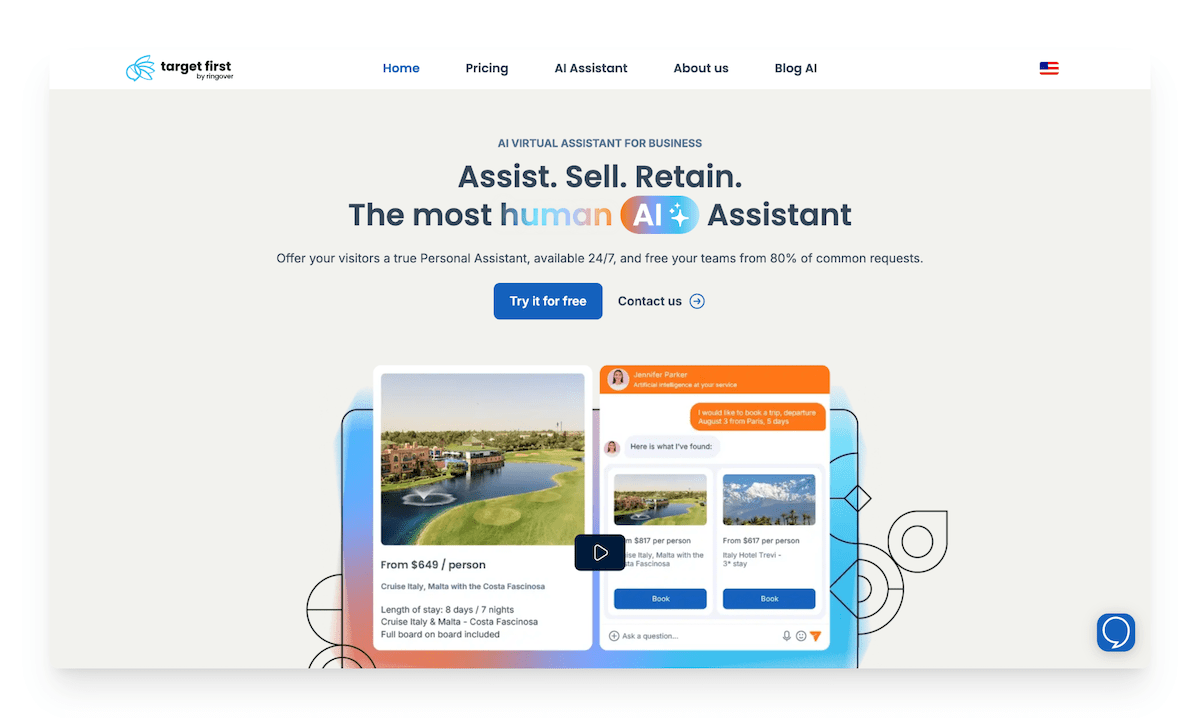
Target First allows you to communicate with your customers before, during, and after your sales. It’s a tool that integrates an instant messaging system, chatbot, free audio calls, and immediate reminders.
Better yet, it’s also a real-time traffic analysis application.
Target First precisely targets visitors to your ecommerce site and blog based on numerous criteria.
It provides you with reports and even sends you alerts when a high-potential buyer is browsing your pages.
A super useful tool for increasing your conversion rate, improving performance, and personalizing your relationship with your customers.
Automate your customer service with Crisp

Crisp is a chatbot solution with several messaging options.
- E-merchants can receive customer communications and respond to them directly.
- E-merchants can set up automated scenarios based on customer requests.
- E-merchants can implement an AI-powered chatbot whose data is compiled from your public or private information.
On the merchant side, the interface takes the form of a chat with easily accessible discussions. Everything is designed to streamline the professional’s experience with fun and practical configuration systems.

Adding Crisp to your WiziShop store is very simple: Follow this tutorial to learn more.
Respond to your customers in the most personalized way with ChatGPT
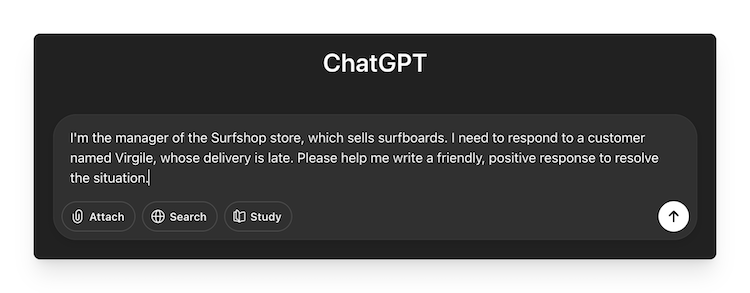
ChatGPT helps you write your texts and find information, but did you know it can help you respond to your ecommerce customers?
Here’s an example of a prompt you can use to send a response that reflects your branding.
Prompt example:
I'm the manager of the XXX store that sells XXX products. I need to respond to a customer named XXX who [reason for the message from the disgruntled customer]. Please help me write a cordial, positive response to resolve the situation.At WiziShop, we understand the importance of chatbots, and we’ve also created our own virtual assistant for our e-merchants.
Directly in your back office, your chat bubble is powered by Maia, the artificial intelligence we developed specifically to support you on a daily basis.
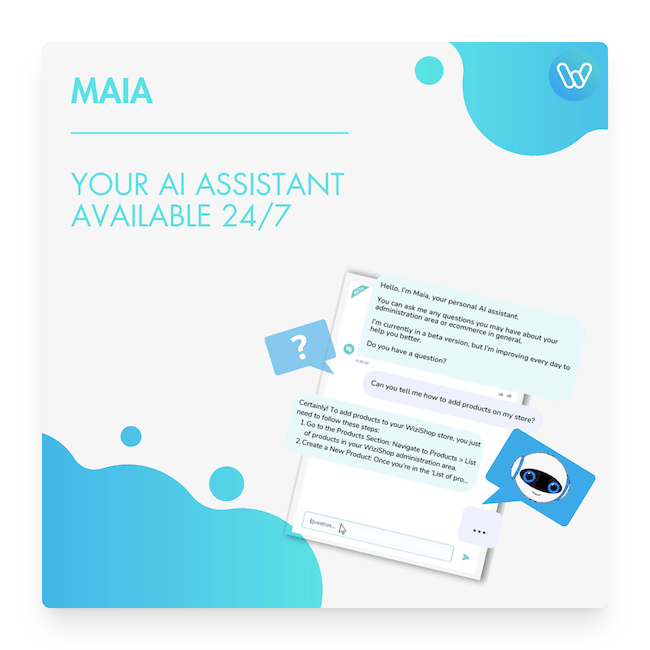
Maia is the ecommerce tool you need to help you reach new heights in just a few clicks. At the center of your WiziShop solution is an ecommerce chatbot that can answer all your questions 24/7.
Maia is available directly in your administration interface. Her goal is to provide you with all the resources and knowledge she has about ecommerce and the WiziShop solution, which she knows inside and out.
This ecommerce AI is based on an internal database as well as the past experiences of thousands of WiziShop e-merchants who have succeeded in ecommerce. Maia will have the answers to all your questions directly in your admin area.
Maia’s mission is to furnish you with extensive resources and expertise on ecommerce and WiziShop. This ecommerce AI bot draws from an internal database and the collective experiences of thriving WiziShop merchants.
In addition to Maia, there are all sorts of other exciting, easy-to-use features awaiting you when you create an online store on WiziShop!
Build an online storefront that suits the vision you have for your business with one of the many customizable design templates available. Take advantage of over 400 pre-integrated features to boost sales of your products, build customer loyalty, and get shoppers to return time and time again.
Avail of our powerful AI text-generation tool, which makes generating product descriptions, translations, blog articles, and other types of text content you wish to create super easy! This in turn will help free up your time and energy for other tasks associated with running an online store.
What’s more, you’ll have access to free training on a variety of ecommerce topics and be able to chat with our friendly team of Business Coaches, who are there to support you for any queries you may have, big or small, concerning your business.
Finally, WiziShop understands the importance of SEO for today’s ecommerce businesses. Therefore, from the moment you sign up on the platform, you’ll automatically benefit from 50+ features for optimizing your site’s technical SEO. You won’t need to do anything extra on your end!
All of the above features and more are included in your WiziShop subscription, regardless of which pricing plan you choose.
Don’t wait any longer: try Maia and WiziShop with a 7-day free trial!
Try WiziShop free for 7 days
THE EASIEST NO-CODE ECOMMERCE SOLUTION✅ No credit card required
✅ Access to all features
✅ No commitment
Ecommerce chatbots are now an extremely effective way to communicate with shoppers, offering personalization and 24-hour convenience, serving as helpful tools to boost engagement and increase sales. Furthermore, they’re expected to only become more intelligent in the future as technology progresses.
Keep your online store up to date by researching which chat platforms members of your target market are likely to use. Then, determine what types of ecommerce chatbots will best serve your needs and the needs of your customers, making their experience with your brand all the more enjoyable!


